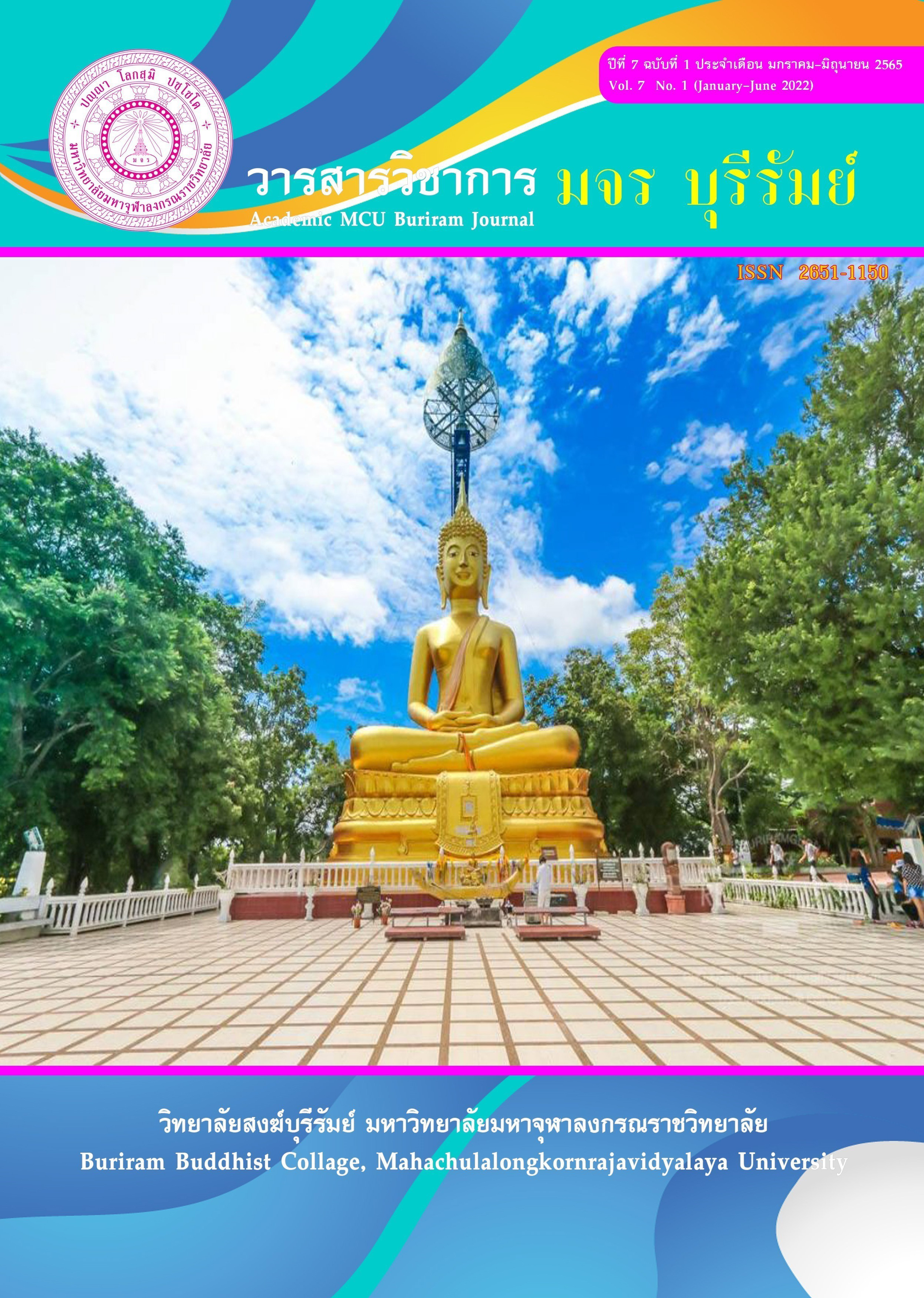A Study of the Buddhist Principles for Promotion of Mental Health of the Elderly in Huai Rat Sub-District, Huai Rat District, Buriram Province
Keywords:
Buddhist Principle, Promotion of Mental Health, The ElderlyAbstract
This research aims 1) to study the Buddhist principles for promotion of mental health of the elderly in Buddhism, 2) to study the problems of mental health of the elderly in Huai Rat sub-district, Huai Rat district, Buriram province, and 3) to suggest guideline for promotion of the mental health of the elderly in Huai Rat sub-district, Huai Rat District, Buriram province. This research is a qualitative research in fieldwork by interviewing 43 sample elderly peoples. Those live in an area of 10 villages in Huai Rat sub-district, Huai Rat District, Buriram province.
The result of research found that:
The Buddhist principles for promotion of the mental health of the elderly was; 1) sublime states of mind (Brahmavihara Dhamma) meant the virtue trusted human’s mind and was living-means for the elderly, 2) virtues of lay people (Gharavasa Dhamma) meant the Buddhist principles that made society harmonious and peaceful and 3) worldly conditions (Loka Dhamma) meant the conditions that risen up and eventually degenerated. The elderly must learn what had happened and was able to live happily. The problems of mental health of elderly found that; they were stress, irritability and worry because they burdened of their children and got congenital disease. One factor of those problems resulted from physical problems. The Guidelines for the promotion of the mental health for the elderly found that the elderly should apply Buddhist principles for daily life, namely; 1) sublime states of mind (Brahmavihara Dhamma): they should practice compassion and kindness to each other and did not interfere physically and verbally with each other, 2) virtues of lay people (Gharavasa Dhamma): They should be faithful to own spouse and others, and 3) worldly conditions (Loka Dhamma): they should consider things that rose and decayed and were ready to face any problems.
References
กมลชนก ภูมิชาติ. (2559). รูปแบบชุมชนต้นแบบที่เป็นมิตรกับผู้สูงอายุ. วิทยานิพนธ์ครุศาสตรมหาบัณฑิต สาขาการจัดการนวัตกรรมเพื่อการพัฒนา. บัณฑิตวิทยาลัย: มหาวิทยาลัยราชภัฏนครศรีธรรมราช.
กลุ่มสถิติประชากร. (2557). การสํารวจประชากรสูงอายุในประเทศไทย พ.ศ. 2557.สำนักงานสถิติแห่งชาติ: กระทรวงเทคโนโลยีสารสนเทศและการสื่อสาร.
ทิพย์วดี เหลืองกระจ่าง. (2556). การพัฒนารูปแบบการเรียนรู้ตามแนวพุทธศาสตร์เพื่อพัฒนาผู้สูงอายุ. ดุษฎีนิพนธ์ครุศาสตรดุษฎีบัณฑิต สาขาวิชาพัฒนาศึกษา. บัณฑิตวิทยาลัย: จุฬาลงกรณ์มหาวิทยาลัย.
พระธรรมโมลี (ทองอยู่ ญาณวิสุทฺโธ). (2551). การศึกษาเชิงวิเคราะห์วิถีชีวิต พฤติกรรมสุขภาพ และการ ดูแลสุขภาพ แบบองค์รวมของพระสงฆ์ที่ปรากฏในพระไตรปิฎก. ดุษฏีนิพนธ์พุทธศาสตรดุษฏีบัณฑิต สาขาวิชาพระพุทธศาสนา. บัณฑิตวิทยาลัย: มหาวิทยาลัยมหาจุฬาลงกรณราชวิทยาลัย.
พระบุญทรง ปุญฺญธโร (หมีดำ). (2549). ปัญหาและทางออกของผู้สูงอายุตามหลักพระพุทธศาสนา. วิทยานิพนธ์ศิลปศาสตรมหาบัณฑิต สาขาวิชาพระพุทธศาสนา. บัณฑิตวิทยาลัย: มหาวิทยาลัยเชียงใหม่.
พระพรหมคุณาภรณ์ (ป.อ.ปยุตฺโต). (2556). คติธรรมแห่งชีวิต. กรุงเทพมหานคร: โรงพิมพ์บริษัทสหธรรมิก จำกัด.
มหาจุฬาลงกรณราชวิทยาลัย. (2539). พระไตรปิฎกภาษาไทย ฉบับมหาจุฬาลงกรณราชวิทยาลัย. กรุงเทพมหานคร: โรงพิมพ์มหาจุฬาลงกรณราชวิทยาลัย.
เศรษฐกิจและสังคมแห่งชาติ. (2556). การคาดประมาณประชากรของประเทศไทย พ.ศ. 2553-2583. กรุงเทพมหานคร: โรงพิมพ์เดือนตุลา.
สำนักงานเทศบาลตำบลห้วยราช ถนนสุขาภิบาล 3. (2564). ข้อมูล ณ วันที่ 1 ตุลาคม.
Downloads
Published
How to Cite
Issue
Section
License
Copyright (c) 2022 Academic MCU Buriram Journal

This work is licensed under a Creative Commons Attribution-NonCommercial-NoDerivatives 4.0 International License.
ทัศนะและความคิดเห็นที่ปรากฏในบทความวารสารฉบับนี้ถือเป็นความรับผิดชอบของผู้เขียนบทความนั้น ไม่ถือเป็นทัศนะและความรับผิดชอบของบรรณาธิการ





